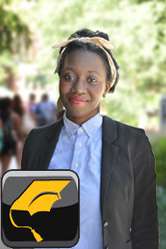Major: Health Administration and Policy Program
“Exploring Poorly Understood Psychosocial Factors for HIV Prevention and Treatment in Urban African American Women”

Today, African American women make up 71 percent of HIV infected women. Much research has been done to better understand how to communicate HIV risk and prevention techniques to African American women. To enhance our understanding of underlying psychosocial factors that are influencing HIV prevention and treatment behaviors in a high-risk population, six high-risk African American women were recruited to participate in qualitative interviews. Interviews were analyzed for common themes around barriers and facilitators to HIV prevention and treatment. Psychosocial factors such as mental stability, self esteem, and community support were identified as playing a roll in women’s motivation to prevent and treat HIV infection.
When did you join the McNair Program?
I joined the McNair Program January 2014.
How did you find out about McNair?
I saw a post about it on myUMBC featuring a current scholar and then advertising for applications. I clicked on the link provided to read more about the program.
What have you gained from being a McNair scholar?
As a McNair scholar, I have gained a vast amount of research knowledge and skills, as well as support in my plans for post-undergraduate endeavors. I have made friends, gained mentors, and have had access to many lifetime resources.
What is your current independent research project?
Right now, I am researching poorly understood psychosocial factors that contribute to HIV prevention and treatment in African American women. I am focusing on the women of color in the Baltimore area, but I hope to expand this soon.
How did you find your mentor for this project?
Dr. Andrea Kalfoglou of the HAPP department has been a professor of mine for consecutive semesters. After talking with her multiple times and realizing that she had similar interests and passions, I asked her to be my mentor and she agreed.
How did you know this was the project you wanted to do?
I watched a documentary in one of Dr. Kalfoglou’s classes called AIDS in Black America. This compelling documentary ignited a huge desire to learn more about the HIV/AIDS epidemic and how it is disproportionately affecting African Americans today. I knew then that I would be doing a project related to HIV prevention.
How much time do you put into it?
I work on my project at least 10-15 hours a week.
What academic background did you have before you started?
I had been a HAPP major for about a year and a half before becoming a McNair scholar and starting my research. I have taken many English/Writing Intensive classes and other helpful classes in the Math department and under the HAPP curriculum.
How much did your mentor help you with your research?
My mentor has been extremely wonderful. She is very dedicated, passionate, and helpful. She actively contributes to the work I do, offering expertise and suggestions along the way. She is always making sure that I have covered all bases and looking for resources to ensure the efficacy of my project. We spend a lot of time discussing the project and establishing connections that are vital to the success of the research I am doing.
What has been the hardest part about your research?
The hardest part about my research has definitely been data analysis. Because I am doing qualitative work, I have to go over my data files again and again to make sure I have everything recorded correctly and then I have to go over all of the data as a whole to draw major conclusions and findings. It is pretty time consuming.
What was the most unexpected thing?
The most unexpected thing was how invested I found myself and how excited I got when I actually started doing field work. The background reading and writing were nothing compared to the rush I got actually working with individuals.
How does your research relate to your work in other classes?
My research relates to the academic content in other classes such as Global Health because I learn more about how prevalent diseases are, how they spread, and the social reasons that contribute to such phenomena. I am also able to refer to research techniques I learned in my Research Methods in Health class while doing my research.
What is your advice to other students about getting involved in research?
I would say don’t be intimidated or brush it off without consideration. I never thought I would ever do research. Whenever I heard “research,” I would automatically think of being in some sort of lab dealing with complex and boring concepts. However, I have found that research is what you make it. You can research whatever you want. Everybody has questions, and it’s nice to get a chance to investigate them and possibly create positive change in that area. It is very rewarding.
What are your career goals?
I would eventually like to get my M.S./Ph.D. in Public Health Management and then work with non-profit public health organizations all over the world.
7/10/2014